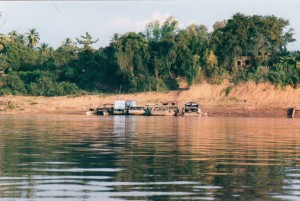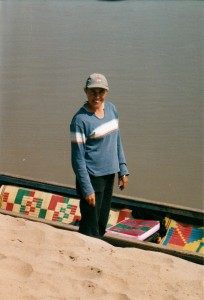[In January 2003 I accompanied an expedition that was conducting a survey of river dolphins on a stretch of the Mekong River in Cambodia. The expedition was led by Isabel Beasley, who was then a PhD student specializing on Orcaella brevirostris: also known as the ‘Irrawaddy Dolphin’ this species is found in many Asian river systems and deltas. The journal I kept during the expedition will appear on this site as a continuous series of posts. This is part 23 of the series.]
In watching Isabel administer this survey, it occurs to me often that this procedure and everything it entails, is exactly the opposite of what it means to study literature. There we study the human mind in the moments when it achieves its peaks of creativity; this process is the opposite: it is to study the absence of excitation; the absence of disturbance; even ‘behaviour’, which might afford some interest, is meticulously excluded. It is as though you were to try to understand a book not by reading it but by watching the writer write.
What does it mean to love this work and to want to do it so much as to give up so many of life’s rewards? When I ask Isabel this she says, first: it’s about the animals and the connection you feel with them (but this, she acknowledges, is a small part of it as the animals are seen only for brief moments; in any case only a few of them are even recognizable as individuals); secondly it’s the feeling that you’re making a difference in a certain way; helping to conserve a species and in that way contributing to the fate of the earth. The third is simply that she likes to be ‘out and about’; a 9-5 office job would not suit her at all. I pointed out that her work was, if not 9-5 exactly, then certainly ‘work’ in the sense that it is built on counting units of time. To this she replied: ‘But it’s outdoors; out in the open.’ This last part is very important to her; it comes naturally. Growing up in New Zealand she loved water-sports – surfing, water-skiing and so on. All these activities come naturally to her. Of her three siblings, two took to cars right away but she and another took to the water and just loved it.



This has started getting boring. Before Mekong Journals, you used to comment/write about other worthwhile subjects. Now it’s all Mekong – day after day.
I’m afraid you will have to bear with me for a while yet. I am a long-distance runner, not a sprinter…
Amitav
I guess am one of those who finds this very interesting – to understand how these conservationists work. It’s not all excitement and eurekas, just heavy grit work is well-known. I love the personal profiles you paint once in a while. Helps understand the nature of people like Isabel who dedicate themselves to such tasks.
But yes, might also have to do with the way you are posting, short posts read once in a few days. Might not be the same experience reading all of them at once.
That’s a good point. I am still trying to find a good (and also feasible) format for these extended pieces. One thing I’m trying to keep in mind is how readers will approach this series of posts when they are all up. Unfortunately they will be reading backwards from the beginning. This is unsatisfactory in some ways but I can’t think of any way around it. To put up the whole document at once would take too great and too concentrated an investment of time. I want to do this blog in a way that is not too taxing and does not intrude too much on my writing time. From my point of view doing short posts is the only solution that is both enjoyable and workable, especially in periods when I’m working on a novel.
I’m sure my readers will understand that writing a blog is something of a departure for me – and I’m sure they will understand also that by the very nature of things it will not be a blog like most others. Blogs are mainly about the here and now. Mine is not. In fact I thought of titling it: There and Then. In the contemporary world, where the Here and Now is so constantly crowding in on us, there is surely a need also for something else?
Still, by the time this series is finished (which will be in about a week) my all-too-brief session of grappling with Ibis III will be over and I will be on the road again. Then perhaps I will write more about the Here and Now.
In any event, thanks very much for your comment – I do appreciate it.
best wishes
Amitav
Hey Amitav,
Just a technical comment, about how your readers could read the series in the order you wrote it in. If you put the Mekong posts in a category (say “Mekong”) then it would just be a question of viewing that category with old posts first.
From there it shouldn’t be that difficult. I’ve just done a google on it, and there seem to be various options. I haven’t used wordpress myself, but if you had someone to help you with this it shouldn’t be too difficult. Otherwise I can try my best to support at a distance.
I am enjoying the posts. As you say they are a long distance effort rather than a sprint; but after reading some of the more factual/detailed ones, it was very nice to get onto the questions of say whether Isabel will marry and have kids or not. For me, you could even add a paragraph or two per post with extra thoughts; longer that that would be a bit prohibitive.
Cheers,
Peter
Hi Peter
Thanks very much for this suggestion. It is quite ingenious! When I have a moment I will set up the categories and re-classify the posts. I really appreciate the feedback.
all best
Amitav
I think the short posts make it easy and convenient to read given that many of us cannot afford to devote much time at a go. Why I enjoy this series of posts is not only because it affords us an insight into the lives of people of being talked about and the painstaking efforts that go into the task of survey and conservation of this nature but also because I also derive a vicarious pleasure not having the privilege to be part of any such expeditions ever!
Many thanks for this Anupam. You’ve confirmed my own feeling about the format. I thought it would be just as daunting for people to read a 10,000 word piece as it would be for me to put it up in one go. The issue of form, as it relates to blogging, is really very interesting and I find myself thinking about it a lot. I think it offers many interesting possibilities and poses some serious challenges to forms like the essay and the memoir. It’s great to have your feedback on this.
all best
Amitav